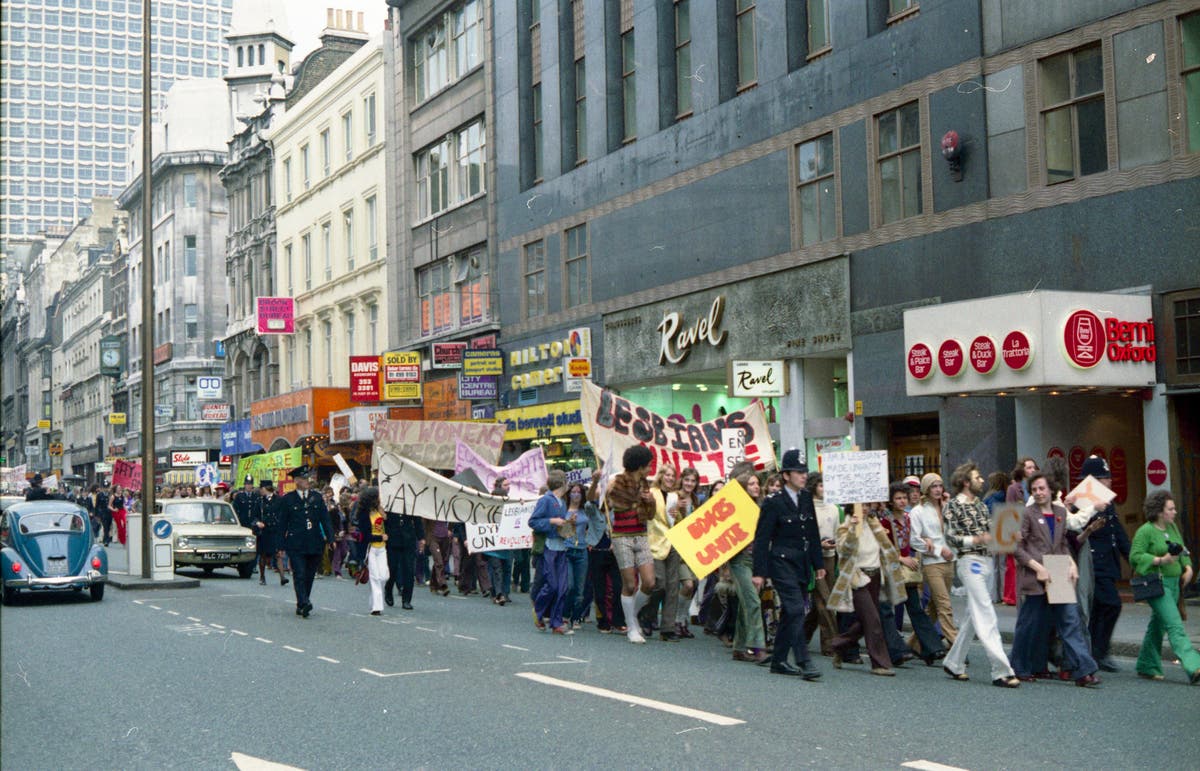
Way back in the early 1970s, I was a member of the newly-formed Gay Liberation Front (GLF). It was Britain’s first movement of openly lesbian, gay, bisexual and transgender people and the first to move beyond mere law reform, to take on the homophobia of the church, media, police and the medical and psychiatric professions.
To combat the invisibility and denigration of the queer community, we decided to organise a “Gay Pride” march, with the theme of being out and proud. This was a radical departure from the norm. In those days, nearly all LGBT+ people were closeted and many felt ashamed of their sexual orientation and gender identity.
I was one of about 30 GLF activists who organised that first UK Pride march, which took place in London on 1 July 1972. Only 700 people turned up. Many of my friends were too scared to march. They thought everyone would be arrested or bashed. That didn’t happen, but we were swamped by a heavy police presence.
Despite this intimidation, we were determined to have a fun time and make our point. The march was a carnival-style parade, which went from Trafalgar Square to Hyde Park. There were lots of extravagant costumes and cheeky banners poking fun at homophobes like the morality campaigner Mary Whitehouse. I marched with my then partner, jazz guitarist Peter Smith, carrying a placard that simply read: “Gay is good” – a revolutionary idea in that era, when most people thought gay was very bad.
We received mixed reactions from the public, some hostile and some supportive – and a lot of curiosity and bewilderment. Most had never knowingly seen a LGBT+ person, let alone hundreds of queers marching to demand human rights.
Unlike nowadays, Pride in 1972 had no commercialisation or corporate sponsorship – and no government funding or messages of support. Not a single politician joined us. The homophobic media refused to report Pride.
When the march arrived at Hyde Park, there was no festival or entertainment – just an impromptu DIY queer picnic, what we called a “Gay Day”. Everyone brought food, booze, dope and music. It was all shared around.
We played camped-up versions of party games like spin the bottle and drop the hanky. I won one of the games and my prize was a long, deep kiss with a gorgeous French gay activist who had come over from Paris to join us. But it was more than good fun. Because we were same-sex kissing in public, which was an arrestable offence in those days, it was also a gesture of defiance.
Looking back over the last 50 years, it is extraordinary how Pride has grown from one march with less than a thousand people to over 150 nationwide events with a combined attendance of a million.
The increasing acceptance of LGBTs is another big change. In 1972, homosexuality was still viewed as an illness, lesbian mothers had their kids taken off them by the courts, you could be sacked from your job for being LGBT+ and the police were at war with our community. Despite the partial decriminalisation of homosexuality in 1967, many aspects of gay male life remained illegal. Thousands of gay and bisexual men were still being arrested for consenting, victimless behaviour – often as a result of police entrapment operations using officers acting as agents provocateurs.
Although there remain many injustices to overcome, our community has made huge strides towards freedom over the last five decades. None of these gains has been given to us on a plate. Every advance has been the hard-won result of determined campaigning. It took us 34 years to win an equal age of consent and 43 years to win marriage equality!
To keep up to speed with all the latest opinions and comment, sign up to our free weekly Voices Dispatches newsletter by clicking here
There is no room for complacency. Although all the major anti-LGBT+ laws have now been repealed, trans people are still battling to reform the Gender Recognition Act so they can self-define and legally change their gender without having to get medical approval. We continue to wait for a ban on conversion therapy that was promised four years ago and the latest government proposal will only prohibit conversion practices targeted at young LGBs. It will not protect trans people at all.
Even today, two thirds of queer people have experienced anti-LGBT violence or abuse, and nearly half of LGBT+ kids in schools have suffered bullying. There remain some LGBTs, mostly from religious communities, who feel ashamed, depressed and sometimes suicidal about their orientation or identity.
Globally, we have a long way to go, with 70 nations criminalising same-sex relations. Penalties range from a few years in jail to life imprisonment. Twelve Muslim-majority nations have the death penalty. Thirty-five of the 69 criminalising countries are Commonwealth member states, acting in defiance of the human rights provisions of the Commonwealth Charter – with no rebuke from the Commonwealth Secretariat. For all these reasons, Pride is still important and needs to remain both a celebration and a protest.
See you on 1 July at 1pm at St Martin’s church in Trafalgar Square. We will be celebrating the exact 50th anniversary of the first Pride in the UK, with a march that retraces the route of the 1972 march to Hyde Park.
The Independent is the official publishing partner of Pride in London 2022
Peter Tatchell is a human rights campaigner and director of the Peter Tatchell Foundation







